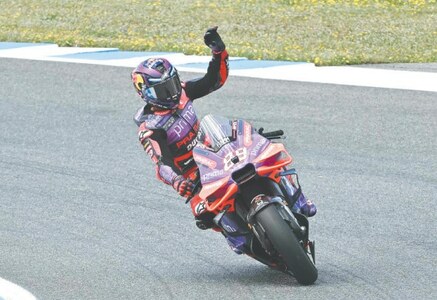MOSCOW: Russian sports officials on Tuesday spoke out against a World Anti-Doping Agency (WADA) committee’s recommendations that the country be banned from the Olympics for four years, saying this was overly harsh and would hurt sport there.
The recommendations, published on Monday, mean Russia could miss out on the next two Olympic Games and world championships in a wide range of sports.
WADA’s independent Compliance Review Committee recommended the ban after Moscow provided WADA with laboratory data that was found to have been doctored.
“It’s sad. I can only call these recommendations unfair,” Umar Kremlev, head of Russia’s boxing federation, said in a statement. “Russia plays an important role in the development of global sport. How can such a country be banned?”
The committee’s recommendations will be put to the agency’s executive committee in Paris on December 9.
For Dmitry Svishchev, president of Russia’s curling federation, the country has already sufficiently been punished for its doping scandals.
“These recommendations are harsh, baseless punishment for old problems for which Russia has already been punished,” he said. “Russia has made great progress in fighting doping. To punish the next generation in such a harsh manner is too much.”
Russian foreign minister Sergei Lavrov cast calls for new anti-doping sanctions as one more Western effort to sideline Russia.
“There are those who want to put Russia in a defensive position accused of pretty much everything in every sphere of international life conflicts, economics, energy, gas pipelines, arms sales,” Lavrov told a news conference in Moscow when asked about the WADA panel’s recommendation.
Russia’s anti-doping chief, however, called the step justified.
The Russian anti-doping agency, known as RUSADA, has been sharply critical of the country’s authorities approach to the issue and said it expects Russia will likely have to accept the consequences.
“They’re to be expected and they’re justified, RUSADA CEO Yuri Ganus said. “One of the conditions for the sports authorities was not met, and unfortunately our athletes become hostages in this situation. Now there’s a question about a possible appeal, but as a lawyer I don’t see how it can be appealed.”
Ganus has long called for a shakeup in how sports are run in Russia, and suggested years of defensiveness had driven Russia into a dead end.
“We’re in the fifth year of this crisis, and unfortunately those individuals running our sport have not just failed to bring it out of the crisis, they’ve stuck it in deeper,” he said, pointing out that the ban would affect Russian athletes at the 2020 Summer Olympics in Tokyo and 2022 Winter Olympics in Beijing. “We are plunging, for the next four years, into a new phase of Russia’s doping crisis.”

Russian IOC member Yelena Isinbayeva said she expected WADA’s executive committee to approve the sanctions, which would be the strictest punishment yet for any country for doping-related offences.
“Experience shows that if there’s already a recommendation, then they will be taken note of and implemented,” the former pole vaulter wrote on Instagram. “I have no illusions about a positive outcome or a negative scenario. I’m just waiting for the ruling to be announced.”
The proposed sanctions are the latest chapter of a saga that began in 2015 when an independent WADA commission investigating allegations of Russian doping during the 2014 Winter Olympics in Sochi said it had found evidence of a vast state-sponsored system stretching back years.
Russian track and field athletes were barred from competing at the Rio Olympics in 2016 although Russians competing in other events were allowed to take part.
The ban was widened to include all events at the 2018 Pyeongchang Winter Olympics, though Russian competitors who could prove they were above suspicion were able to compete as neutrals under the Olympic flag.
Under the latest recommendations, some Russians without a history of doping could be cleared to compete in major international events as neutrals, as was the case in Pyeongchang.
The IOC said in a statement it welcomed the opportunity for clean Russian athletes to compete, saying WADA did not indicate “any wrongdoing by the sports movement in this regard, in particular the Russian Olympic Committee or its members.”
The committee also recommended barring Russia from hosting major sporting events for four years, and moving major events for which Russia has already won hosting rights elsewhere “unless it is legally or practically impossible to do so.”
Russia is currently set to host the 2023 men’s world ice hockey championships. St Petersburg is due to host four matches in the 2020 European championships and was selected to host the Champions League final in 2021. These fixtures may not be affected by a new WADA ban as European football’s organising body UEFA is not on its list of signatories.
“Given that UEFA is not a WADA signatory and Russian footballers have not been caught doping, I am 99.9% certain that nothing will happen with the Euro next year,” parliamentarian Igor Lebedev, a former member of the Russian Football Union’s executive committee, was quoted as saying by the Interfax news agency.
Russian President Vladimir Putin is set to meet UEFA President Aleksander Ceferin in St Petersburg on Wednesday.
Published in Dawn, November 27th, 2019

















































Dear visitor, the comments section is undergoing an overhaul and will return soon.